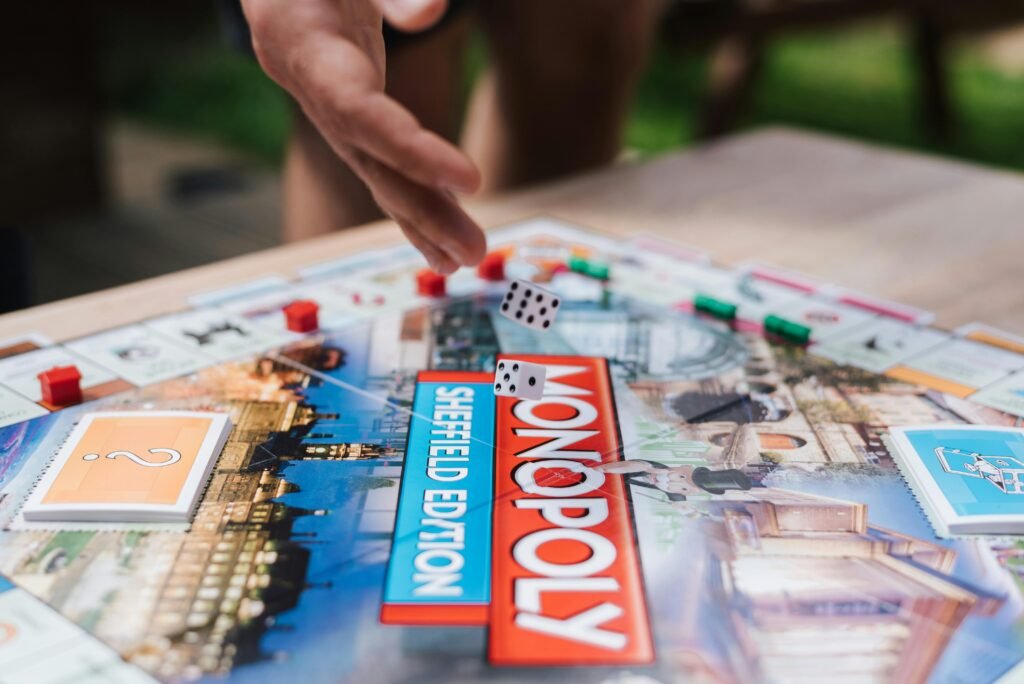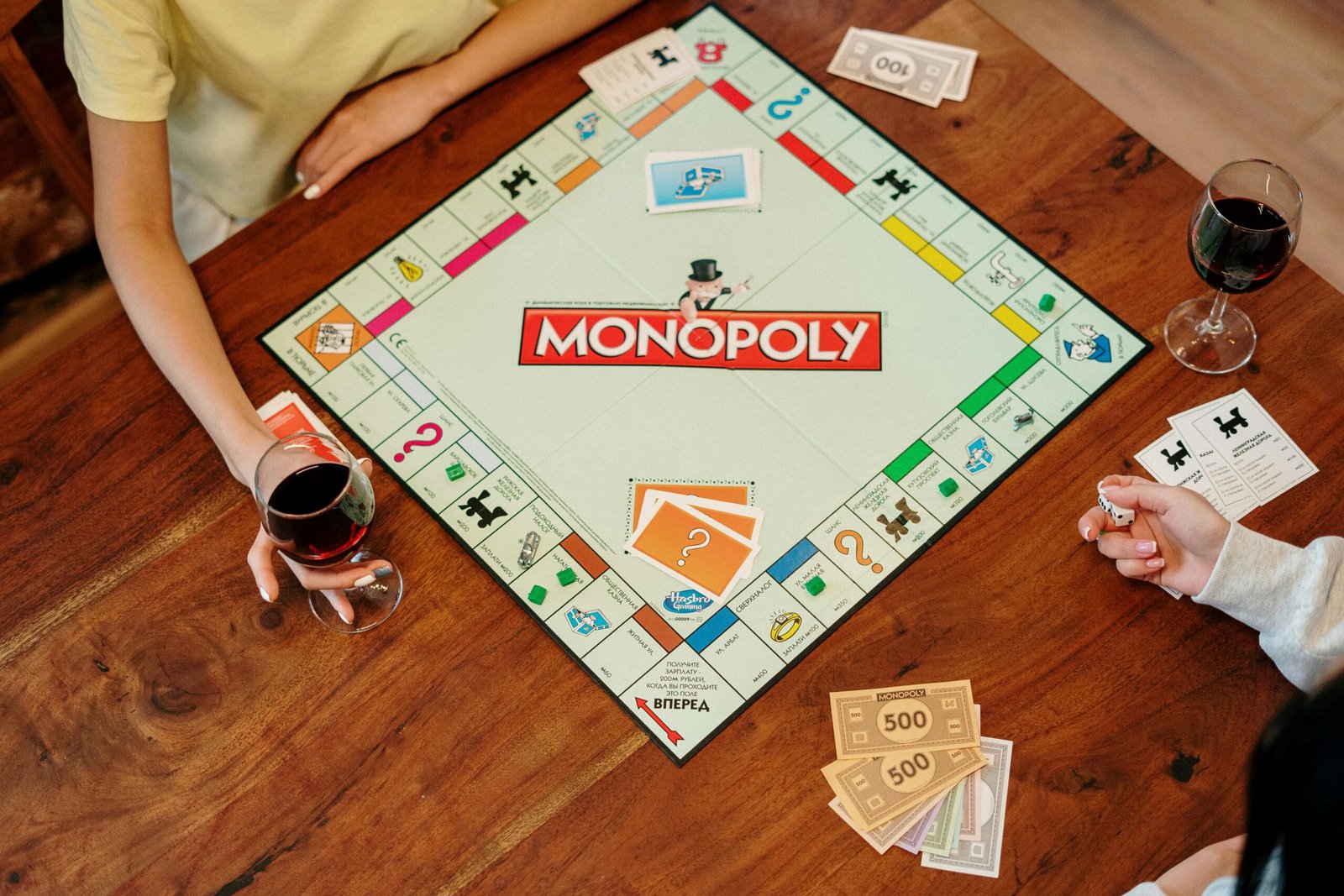In a rapidly changing economic world, financial literacy is no longer optional—it’s essential. While schools across the EU are slowly integrating financial education into curricula, much of the responsibility still falls on parents and guardians. So how can we make learning about money engaging and age-appropriate?
The answer might be hiding in your living room cupboard: board games. One of the most iconic is Monopoly, a game that has been both praised and criticized for how it teaches money management. But with a little guidance, Monopoly—and other smart alternatives—can become powerful tools to teach children how to save, invest, and spend wisely.

🎲 Why Monopoly Still Matters?
First published in 1935, Monopoly remains one of the most iconic and widely played board games in the world. Despite criticism that it relies too heavily on luck, its real value lies in the economic discussions and behavioral patterns it sparks—especially among children.
At its core, Monopoly teaches:
- Asset management – Players learn to make decisions about purchasing and developing properties.
- Income and expense tracking – Managing cash flow between rents, taxes, and purchases.
- Negotiation skills – Trading properties, making deals, and forming short-term alliances.
- Long-term planning – Strategic thinking about where to invest, when to hold, and when to risk.
What makes Monopoly especially valuable as a teaching tool is its ability to simulate a simplified version of capitalism. Children begin to understand how wealth can be created, leveraged, and lost. They feel firsthand the pain of poor planning, the reward of good timing, and the consequences of overextending financially.
🧩 Different Editions for Different Ages
There are several editions of Monopoly that make the game more accessible or more realistic:
- Monopoly Junior – A simplified version ideal for kids aged 5–8, focusing on basic transactions and simple concepts.
- Monopoly Deal – A fast-paced card game version that hones negotiation, asset collection, and tactical decision-making in under 20 minutes.
- Monopoly Ultimate Banking – Introduces digital transactions and a cashless economy, helping children understand modern financial systems.
You can even find region-specific editions in France, Germany, and other EU countries, which helps children connect to local geography and economy.

👨🏫 Parent Involvement Is Key
The game truly shines when parents engage actively during and after gameplay. Don’t just let kids roll the dice and move tokens—ask open-ended questions:
- Why did you buy that property?
- Was it worth building houses so early?
- Would you have made that trade in real life?
After the game, take 10 minutes to debrief:
- What strategies worked or failed?
- Who took the most risks, and did it pay off?
- What would you do differently next time?
This discussion cements the lessons far more effectively than simply “playing to win.”
💬 Real-Life Parallels
You can draw real-world connections during the game:
- Taxes and chance cards reflect unexpected life events.
- Running out of cash and mortgaging properties demonstrates the cost of debt.
- Winning through smart trades (not just lucky rolls) illustrates leverage and negotiation.
With repetition, children develop instincts about saving, spending, investing, and managing both opportunity and scarcity—core competencies for financial literacy.

🧠 Beyond Monopoly: Smart Alternatives
If Monopoly feels too long or chaotic, try one of these modern board games that focus specifically on financial education, critical thinking, and business skills:
1. Cashflow for Kids (by Robert Kiyosaki)
- Age: 6+
- Focus: Assets vs liabilities, passive income, early investing
- Why it’s great: Designed by the author of Rich Dad, Poor Dad, it simplifies real-world investment logic.
2. The Game of Life
- Age: 8+
- Focus: Career choices, education costs, saving for retirement
- Benefits: Teaches how early decisions can affect lifelong income.
3. Pay Day
- Age: 8+
- Focus: Monthly budgeting, bills, surprise expenses
- Takeaway: Helps children understand that income doesn’t equal disposable cash.
4. Budget Town (German: Haushaltsstadt)
- Age: 10+
- Focus: Everyday economics and budgeting
- Advantage: Popular in German-speaking schools, designed to support EU-level financial skills.
5. InvestMate App (Teens & Adults)
- Not a board game, but a gamified investing simulator.
- Helps teens understand stocks, bonds, and market logic using EU market data.

💡 Real-World Lessons Through Play
Games create safe spaces for mistakes—a child might go bankrupt in Monopoly, but they’ll remember what caused it: overspending, risky trades, or lack of planning. These lessons, if discussed afterwards, build mental models that stay with them into adulthood.
Tips for parents:
- Don’t just play—talk! Ask, “What would you do differently next time?”
- Reward smart decisions in the game (like saving or waiting to invest).
- Let them make poor choices—don’t interfere, but debrief afterward.
- Rotate games monthly to avoid repetition and boredom.
🏫 Schools and Financial Education in the EU
Several European countries (like France, Germany, the Netherlands) have integrated basic economic education into schools—but often too late, or too abstract. Games bridge that gap with practical, hands-on experience, even before age 10.
Some NGOs and educational startups across Europe even organize “financial bootcamps” for children, using board games, simulations, and roleplay to explore entrepreneurship, taxes, and consumer choices.
If you’re homeschooling, or simply want to supplement what your child is learning, these tools are essential.
👨👩👧👦 Long-Term Benefits: Entrepreneurs in the Making
Children who engage with financial simulations from an early age:
- Tend to have better budgeting habits as adults
- Are more open to investing and entrepreneurship
- Have stronger negotiation and critical thinking skills
By the time they reach adulthood, they’re more likely to understand the value of:
- Time (compound interest, delayed gratification)
- Strategy (thinking 3–4 moves ahead)
- Risk (when to go bold, when to hold)
These are foundational traits not just for personal financial health, but for future business leaders in Europe.
🖥️ Final Thought: Combine Financial Knowledge With Digital Literacy
In today’s world, financial literacy must go hand-in-hand with digital literacy. As your children learn to manage money, help them understand the importance of their digital footprint as well—especially as future entrepreneurs or freelancers.
And if you’re a parent who runs a business yourself, remember: you’re the example they’re watching. Make sure your own financial structure and online presence reflect the mindset you want to pass on.
Visit Rakuzan.eu if your business still needs a professional, secure website—and don’t forget, if you need reliable hosting or a domain, Hostinger offers excellent value and speed for businesses in the EU.
Disclaimer: This article is for informational purposes only and does not constitute financial, tax, or investment advice. Readers should consult with a licensed professional before making any financial or business decisions.





